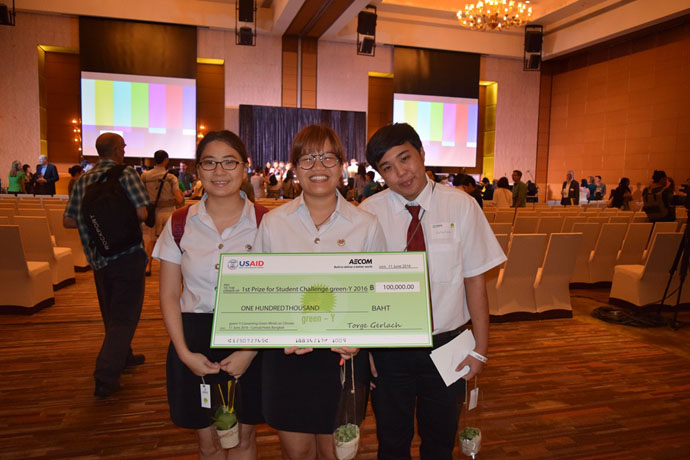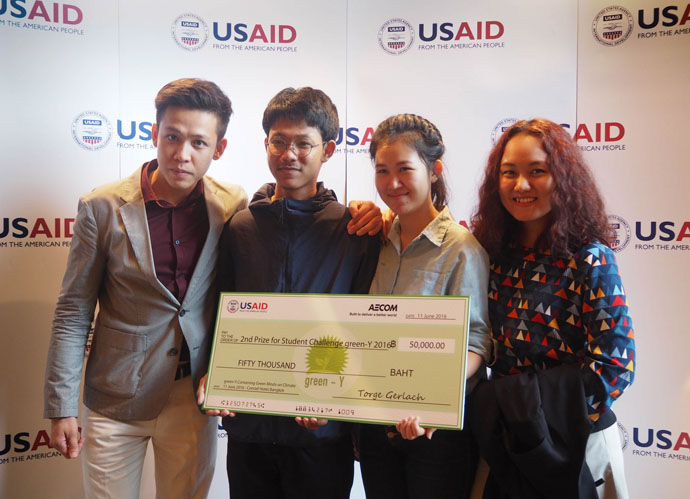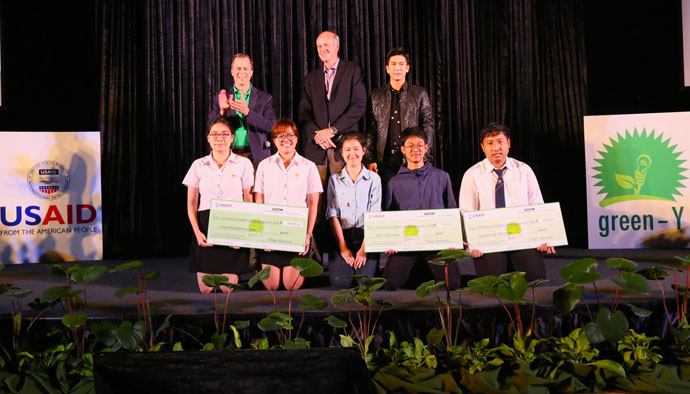Students take the lead in tackling climate change at green-Y
Around 300 university students and professionals came together for an afternoon with leading thinkers, innovators and climate change experts from Asia at the green-Y event June 11 in Bangkok. Organized by the U.S. Agency for International Development (USAID) Regional Development Mission for Asia and its four climate change implementing partners, the event involved a suite of talks, demonstrations and ideas around the theme ‘convening green minds,’ aimed at inspiring the next generation to act on climate change.
As the implementing partner for the USAID Adapt Asia-Pacific project, AECOM was one of the core organizers for the program, sponsoring plenary speakers, supporting the event’s photo exhibition and organizing a student challenge aimed at drawing the attention of youth towards the challenges of climate change. As a staff member of USAID Adapt Asia-Pacific, I was fortunate to be tasked to coordinate the student challenge.
The student challenge asked a simple and very powerful question: The negative impacts of climate change are affecting communities all across Asia. Everyday, lives and livelihoods are being disrupted by sea level rise, severe storms, regular flooding, heat waves and frequent droughts. There are many ways you can address climate change. If you had 100,000 THB how would you tackle climate change in your community?
Photos: above – Montakan Tanchaisawat / USAID; below – Teeraporn Voraphakun / USAID.

We invited entries from university students in the form of two-minute video presentations. To tease out the best ideas, we encouraged students to work in collaboration with the environmental clubs at the universities and to consult with professors and faculty members.
Despite the event being held in the middle of the exam period, there was great interest from across Thailand’s universities. Students saw this as not only an opportunity to win the prize but also an avenue to share their ideas and learn from peers about initiatives and innovations on environmental and climate change issues.
The entries ranged widely, from campaigns to inform the community about the impacts of climate change to initiatives for reducing the carbon footprint of daily food supplies. The ideas reinforced the central theme of USAID Adapt Asia-Pacific and AECOM’s work in climate change – that promoting climate resiliency is a global imperative.
The organizing committee picked the top three entries, and then the audience at the event picked the winners. AECOM’s President for International Development Torge Gerlach and U.S. Ambassador to Thailand H.E. Glyn T. Davies presented the AECOM-funded student prizes.
ABAC Preservers Club from Assumption University won first prize. “The green-Y award is like fuel for us to keep the club going,” said Ms. Wanwisa Kudthalaeng, president of ABAC Preservers Club. “It gives us strength and courage to continue doing environmental preservation camps”.
After presenting a thought-provoking idea regarding their environmental preservation camps, the club is now planning to increase the number of preservation camps they hold each year. Their camps aim to increase awareness levels in environmental and climate change issues amongst high school and junior high school students from diverse backgrounds and to spread the club’s environmental ideology to students and villagers in remote areas. In the past, camp participants were limited to 30 people or fewer due to budget constraints. With the prize money, the club intends to increase the number of participants at each camp and try to bring together participants representing each sub-district. The hope is that the camp participants will later pass on the environmental knowledge and concepts introduced at the camp to their communities.

Photo: Montakan Tanchaisawat / USAID
Chiang Mai University (CMU) Theatre for Social Change Group won second prize with their unique idea to raise awareness about air pollution and climate change through one-act street-plays. Expressing his gratitude to USAID, AECOM, and the green-Y organizing team, Professor Kitt Wongarsa, the CMU Theatre for Social Change Group advisor, said “We think of this fund as a new beginning for us to produce plays for our community. We are now hoping for a new spark of ideas for plays or other presentations that will further change society in various ways”. He further added that participants at the green-Y event appreciated the great support they received from CMU to participate in the event.
The prize money will be used to buy equipment for plays, pay for expenses during practices, and transportation to other schools in Chiang Mai province. The group also has plans to collaborate with other institutions in Chiang Mai province, including Yupparaj Wittayalai School and Chiang Mai University Demonstration School, as well as local organizations such as Suthep SAO (Sub-District Administrative Organization) in Chiang Mai province and Umong SAO in Lamphun Province.

Photo: Richard Nyberg / USAID
Eastern Asia University (EAU) Preserver Club won third prize with an innovative idea for a dam project. The prize will assist their fundraising efforts and boost the morale of members to make further contributions to the environment and community. Mr. Jeerawat Jamduang from the EAU Preserver Club commented, “The green-Y student challenge is a good initiative that supports youth who are environmentally conscious and have a volunteer spirit” he said. “Not only does it encourage people like us, but it also leads the society and environment to a better state”.
Organizing the student challenge was a great learning experience for me. It was a unique opportunity to witness firsthand how some of our youth in Asia perceive environmental and climate change issues. It was uplifting to meet young people with so many innovative ideas for how we could address today’s environmental and climate change issues. It was equally inspiring to see how our contributions are having a real positive impact on the ground, and I was happy to be playing a small part in that – in building a better world!






